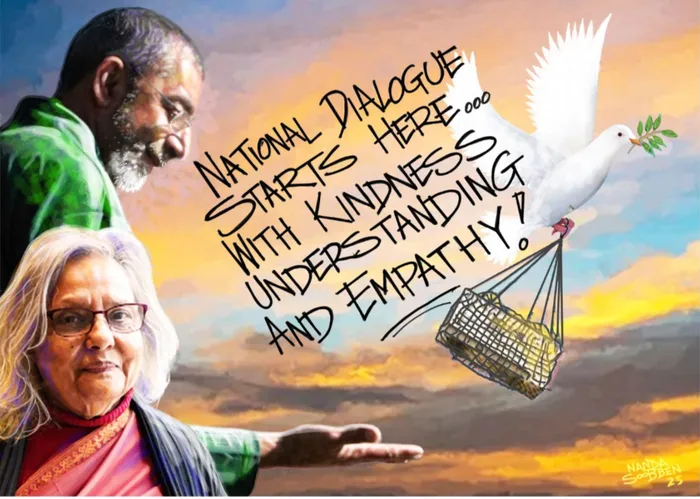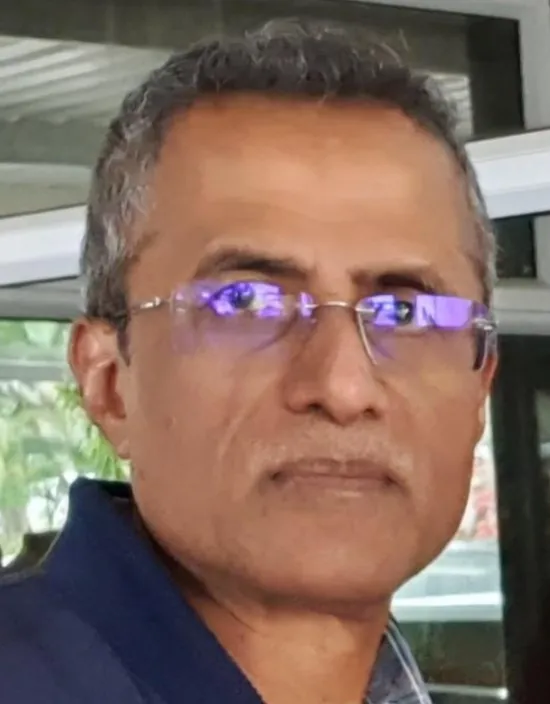National Dialogue 2.0… the last throw of the dice?
South Africa's crossroads

A cartoon by award-winning, Nanda Soobben
Image: Nanda Soobben
IT IS A common cause that 31 years since the formal demise of apartheid, the promises, great expectations and dreams of democracy are rapidly turning into horrific nightmares for the poor and disadvantaged. At the same time (new and old) elites rule the roost.
Socio-economic and spatial inequalities of the apartheid era widened, while the politically-connected continued to accumulate wealth and power at the expense of the poor. Crime and corruption escalate exponentially and are inextricably connected to political elites, global mafia operations of every genre magnetically gravitate to our country, and gender-based violence is a pandemic.
South Africa has one of the highest unemployment rates in the world (33%), especially among young adults. The poor have inadequate access to essential services like water, electricity, health care and basic education. Many of these challenges were aggravated by state capture. As highlighted by the Zondo Commission, state capture in South Africa involved the systematic and deliberate subversion of state-owned enterprises (SOEs) for private gain.
State capture eroded good governance practices within SOEs and government departments (including law enforcement and intelligence services), decreasing operational performance and effectiveness. This entailed influencing appointments, procurement procedures, governance, and institutional structures to favour specific individuals and organisations.
Key SOEs like Eskom, Transnet, and South African Airways were significantly impacted by state capture, with subsequent multiplier effects on all aspects of South African life, destroying the economy. All these problems and challenges were aggravated during the hegemonic rule and reign of one political party, the ANC. Not surprisingly, some of its senior members were implicated in the State Capture report. Still, no one has yet been convicted because of the hollowing out of capacity in the National Prosecuting Authority.
When he was firmly ensconced on the throne, Jacob Zuma repeatedly said that the "ANC will rule until Jesus returns". However, there were some obvious indications that the ANC was haemorrhaging, for example, in the 2021 Local Government Elections, it received 45.59% of the vote. In the May 2024 General Elections, the ANC lost its parliamentary majority, winning 40.18% of the vote.
Ironically, Zuma’s newly-established uMkhonto weSizwe (MK) Party (while he still claimed to be a disciplined member of the ANC) eroded the support of the ANC, winning 14.58% of the vote. The notion of a National Dialogue entered the public domain against the background of the ANC’s declining electoral support. Former president Thabo Mbeki initially proposed a national dialogue in May 2024, where he called for “seismic reflections".
This was endorsed by President Cyril Ramaphosa, who in his inauguration address after the May 2024 national elections, invited “all parties, civil society, labour, business and other formations to a national dialogue on the critical challenges facing the nation”.
President Ramaphosa said: “By establishing the government of national unity, by preparing for a national dialogue, we have deliberately set ourselves along the path towards a ‘co-operation nation.’ We would like all of us as South Africans to behave like ‘weaver birds’... despite all the challenges, despite our differences, despite all the headwinds.”
There is a view that ruling elites have frequently utilised national dialogues to obtain or regain political legitimacy. According to the Geneva-based Inclusive Peace and Transition Initiative: “National Dialogues are typically convened when the fundamental nature or survival of a government in power is questioned. Thus, they usually intend to redefine the relationship between the state, political actors, and society by negotiating a new social contract.”
A national dialogue can be used for peacebuilding and reconciliation to increase confidence and trust amongst national actors, encourage inclusive engagement, and advance agreement on critical social, political, and economic challenges. The "National Dialogue Handbook" defines national dialogues as: “nationally owned political processes aimed at generating consensus among a broad range of national stakeholders in times of deep political crisis, in post-war situations or during far-reaching political transitions.”
The goal is for national leaders (political, business, religious, civil society, sports, etc.) across the ideological spectrum to debate, discuss and encourage inclusive engagement and advance agreement on significant social, political, and economic challenges. It is worth noting that the first National Dialogue was the Convention for a Democratic South Africa (CODESA), which took place in Johannesburg in December 1991. It was a critical step in the process of transitioning South Africa from apartheid to a democratic state.
Nineteen political organisations participated, including the ruling National Party and the dominant African National Congress (ANC), comprising 228 delegates. Key aspects of CODESA included signing a "Declaration of Intent" committing to negotiations and creating a new, democratic constitution. The parties agreed on the principles of a unified, democratic, and non-racial South Africa, with a supreme constitution and an independent judiciary. CODESA established the foundation for negotiations for a democratic South Africa.
While there were many disagreements, CODESA was a crucial step in the process of dismantling apartheid and building a new nation. The procedure was sufficiently adaptable to permit the creation of new forums and committees and modifications to existing ones based on political exigencies.As South Africa’s transition from apartheid proceeded (with all its twists and turns), a Multi-Party Negotiating Process (MPNP) was established in March 1993, culminating in the adoption of an interim Constitution and preparations for the country's first non-racial elections.
Parties with opposing views had to make substantial concessions during this process. Given the protracted conflict and violent past, the comparatively quiet and orderly democratic transition was praised globally as a miracle. Essential outcomes from the first National Dialogue were the RDP and the Constitution. The National Development Plan (NDP), which presented a long-term vision and goals for South Africa to achieve by 2030, was released in 2012.
All three documents can influence outcomes in the National Dialogue 2.0. There is no need to reinvent the wheel. Almost a year since it was initially proposed, on June 10, 2025, Ramaphosa released the names of the Eminent Persons Group to “guide and champion the National Dialogue.”
All the problems in South Africa cannot be solved by national dialogues alone. For a national dialogue to be successful, several challenges must be addressed, including political actors' opposition and resistance to change, a lack of support from groups, persistent violence, crime, corruption, instability, and a lack of inclusivity.
The National Dialogue 2.0 should not be about saving the ANC. It is about saving our country. All stakeholders must put their shoulders to the wheel, rise above personal, parochial, and party interests, and put South Africa first. In many respects, National Dialogue 2.0 may well be the last throw of the dice.

Brij Maharaj
Image: File
Brij Maharaj is a geography professor at UKZN. He writes in his personal capacity.
** The views expressed do not necessarily reflect the views of IOL or Independent Media.